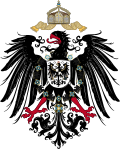| Order of Ernst Augustus | |
|---|---|
 Insignia of Knight Grand Cross of the Order of Ernst August | |
| Awarded by Kingdom of Hannover | |
| Type | Knightly State Order |
| Motto | SUSCIPERE ET FINIRE |
| Awarded for | Civil and military merit |
| Status | Dissolved as a state order, given as a House Order |
| Grand Master | Ernst August, Prince of Hanover |
| Grades | Grand Cross Grand Commander Commander Officer Knight |
| Precedence | |
| Next (higher) | Royal Guelphic Order |
| Next (lower) | - |
| Ribbon of the order | |
The Order of Ernst August (German : Ernst-August-Orden) was founded 15 December 1865 by King George V of Hanover in memory of his father Ernest Augustus, King of Hanover. The order was awarded for both civil and military merit. [1] It was divided in five classes:
Contents
- Grand Cross
- Grand Commander
- Commander
- Officer
- Knight
